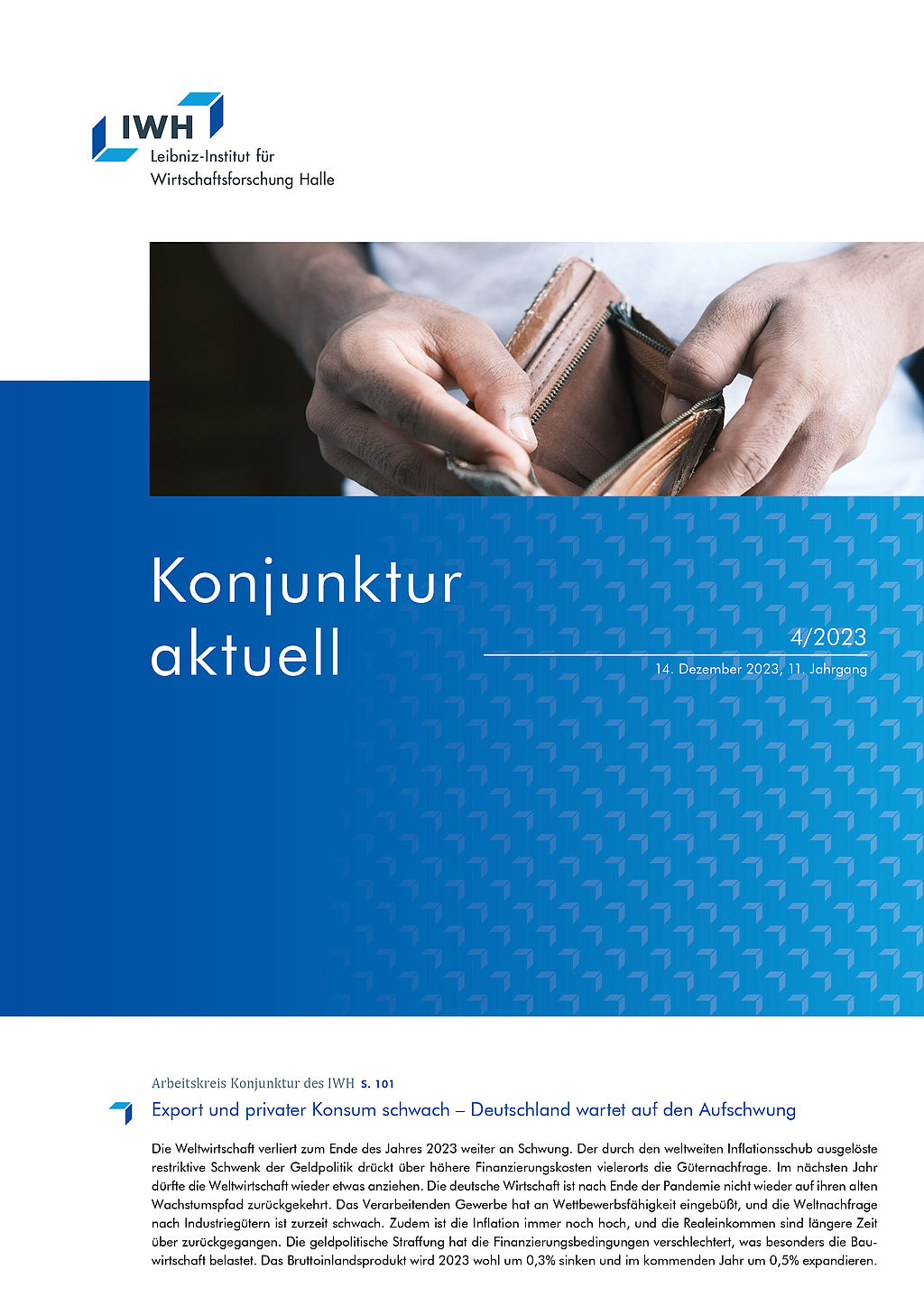Green transition and the debt brake: Implications of additional investment for public finances and private consumption in Germany
The German Climate Protection Act requires drastic reductions in greenhouse gas emissions that have far-reaching consequences for overall economic development and public finances. Investment has to increase by about 2.5% in relation to gross domestic product. A macroeconomic growth model helps assessing the consequences for private consumption and public households. A scenario in which there is no investment in climate emissions reduction beyond the current trend and the climate protection targets are missed serves as a benchmark. In this case, gross domestic product increases by 0.75% per year up to 2030, which is slightly less than in previous years.
Even if we assume that the rate of expansion of renewable energies doubles, gross domestic product will grow at an annual rate of just under 0.5%, which is slower than in the scenario without further emission reduction measures.
In order to achieve the emission reduction targets, the use of fossil fuels must decrease more than is to be expected without further policy action. In principle, this could be achieved by accelerating the expansion of renewable energies. "Even if we assume that the rate of expansion of renewable energies doubles, gross domestic product will grow at an annual rate of just under 0.5%, which is slower than in the scenario without further emission reduction measures," says Oliver Holtemöller, head of the Macroeconomics Department and vice president at IWH. To estimate the effects on private consumption, it is assumed that the increase in the costs of green investments that are borne by the private sector is at the expense of other private investment activity. Furthermore, the state bears two thirds of the total investment costs by subsidising private investments and expanding public investments, and taxation on private households increases in order to comply with the debt brake. In this case, the higher investments are at the expense of private consumption, which stagnates per capita, while it would increase by 0.2% annually in the scenario without the climate targets. The government revenue ratio increases in this case from 47% in 2022 to just under 51% in 2030 (49% in the scenario without further political measures). Burdens on private consumption would be less if investments were financed via public deficits. In this case and to the extent that foreign investors invested in the government bonds issued, the high German current account surplus would be somewhat reduced. This, however, means higher government interest expenditure in the future. If no additional investments are made but the climate targets are nevertheless met by restricting the use of fossil fuels, gross domestic product will stagnate and private consumption will fall slightly.
The extended version of the forecast contains three boxes (all in German):
Box 1: On the revision of the production potential
Box 2: On the assumptions used for the projection
Box 3: On the formal structure of the growth model used
Long version (in German): Andrej Drygalla, Katja Heinisch, Oliver Holtemöller, Axel Lindner, Alessandro Sardone, Christoph Schult, Birgit Schultz, Götz Zeddies: Grüne Transformation und Schuldenbremse: Implikationen zusätzlicher Investitionen für öffentliche Finanzen und privaten Konsum, in: IWH, Konjunktur aktuell, Jg. 11 (4), 2023, 141‒159. Halle (Saale) 2023.
Whom to contact
For Researchers

Vice President Department Head
If you have any further questions please contact me.
+49 345 7753-800 Request per E-MailFor Journalists

Head of Public Relations
If you have any further questions please contact me.
+49 345 7753-720 Request per E-MailIWH list of experts
The IWH list of experts provides an overview of IWH research topics and the researchers and scientists in these areas. The relevant experts for the topics listed there can be reached for questions as usual through the IWH Press Office.
Related Publications

Grüne Transformation und Schuldenbremse: Implikationen zusätzlicher Investitionen für öffentliche Finanzen und privaten Konsum
in: Konjunktur aktuell, 4, 2023
Abstract
Das deutsche Klimaschutzgesetz sieht unter anderem vor, dass die Treibhausgas-Emissionen in Deutschland bis zum Jahr 2030 um 65% gegenüber dem Jahr 1990 verringert werden. Die damit einhergehende Transformation der Wirtschaft hat weitreichende Konsequenzen für die gesamtwirtschaftliche Entwicklung und die öffentlichen Finanzen. Alles in allem erfordert der Ausbau erneuerbarer Energien für die Klimaschutzziele jährliche Investitionen in der Größenordnung von 2,5% in Relation zum Bruttoinlandsprodukt. Mithilfe eines makroökonomischen Modells kann gezeigt werden, mit welchen gesamtwirtschaftlichen Entwicklungen zu rechnen ist, wenn die Klimaschutzziele eingehalten werden.



